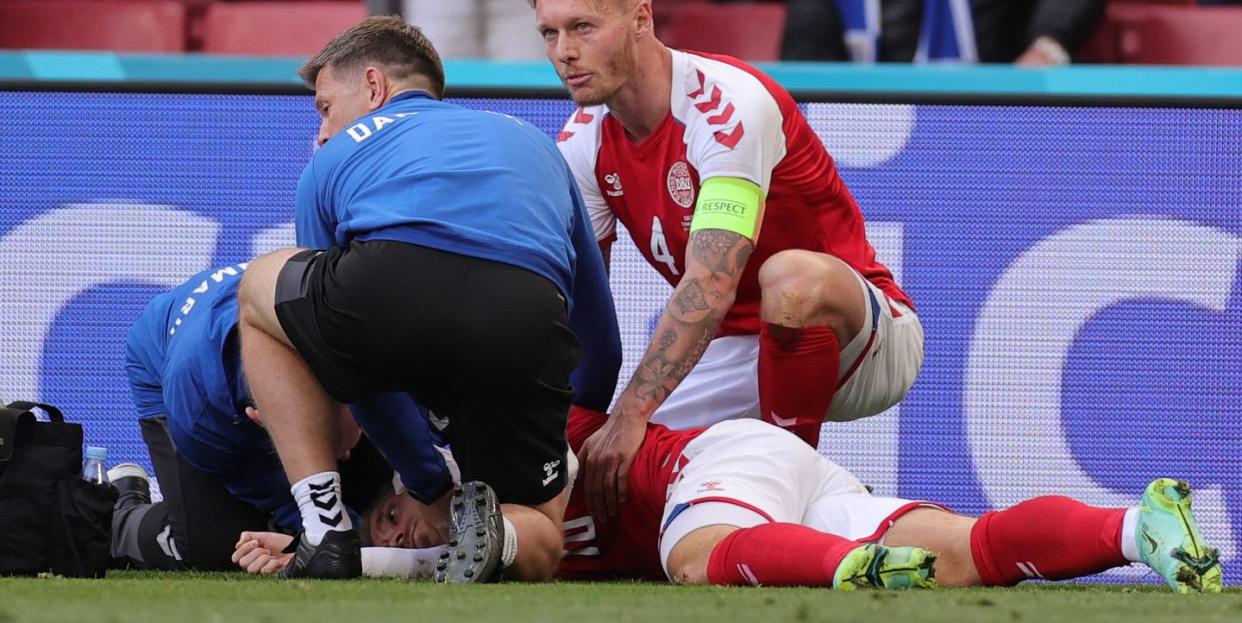Christian Eriksen's Fall Was a Moment of Horror, But Other People Were There to Save Him

It was a moment of suspended animation when Christian Eriksen fell. First when he stumbled, and his body went limp—draped in the air, almost, before he fell to the ground. And then there was the moment, two beats at most, before everyone around him knew that something truly horrible had happened. He had been as full of life as could be conceived of just seconds before: fresh off a league title in Italy with Inter Milan in the club season, conducting the orchestra from the heart of Denmark's midfield at the European Championships, eyes on qualifying for the knockout stage and the racing pulse of single-elimination cup soccer. And then, slowly and then all at once, he fell. His heart had stopped beating at age 29, right there on the field, as he sought to control the ball off a throw-in from a teammate.
His compatriots rushed to him. Simon Kjaer, the Danish captain who has shared the field with Eriksen so many times while they represented their nation, crouched down and pulled his tongue from his throat so he would not choke. Referee Anthony Taylor realized the situation at lightning pace, and the medics were on the field and administering CPR in no time. Later, a team doctor would say that Eriksen was clinically dead before he was brought back using a defibrillator. The swiftness, and the professionalism, and the basic humanity of it all saved Christian Eriksen's life. He is now alive and stable, FaceTiming his teammates from a hospital in Copenhagen. But it could have been so different. It is not unheard of for a young and otherwise healthy soccer player to collapse on the field and to die. Marc Vivian Foe in 2003. Phil O'Donnell in 2007. Cheick Tiote, a box-to-box midfield hustler in his time, during a training session in 2017. Soccer is not always thought of as a dangerous game, but it is—and not just because it’s a sport where your leg can be shattered in an instant. The physical demands are formidable, particularly in the summer heat of an international tournament.

The whole soccer world erupted in horror, then sympathy, then relief as the news rolled in on Saturday. Eriksen will live. But he may well never play again, and the horror of it all will linger besides. It was so terrible when Christian Eriksen fell because it brought all thoughts to his family, and his teammates, and his millions of fans around the world—young Tottenham Hotspur fans who tried to play like him in their back gardens in North London, an Inter supporter who would have cheered him from lockdown in Milan this past year. His wife, Sabrina Kvist Jensen, was quickly on the field after it happened, comforted by Captain Kjaer—who established himself as a giant of a leader in that instant—and goalkeeper Kasper Schmeichel.
Get unlimited access to Esquire's sports coverage. Join Esquire Select.
But it was horrible also because, maybe, it reminded those who witnessed it of the grasping, fleeting nature of it all. Our lives, our lives as we know them. He was so alive, so present, living his greatest dreams as a young boy, and then he fell. Our time here is limited, we were reminded, and we never know just how much so. Even a 29-year-old professional athlete, perfectly healthy by all the insights medical tests can provide, can fall just as surely as our elders who know their time is near. It can just happen, in an instant, in front of the whole world—or not. The other thought it surfaced, at least in me, was that some of us will fall when no one is around to see it.
And then there's Kjaer, and all the others who came to Eriksen's aid, and the aid of those who love him. We are here together, after all, to look after one another, to make it all a little easier. It's a cruel world, a random one, a scary one. But we are here together.
You Might Also Like
